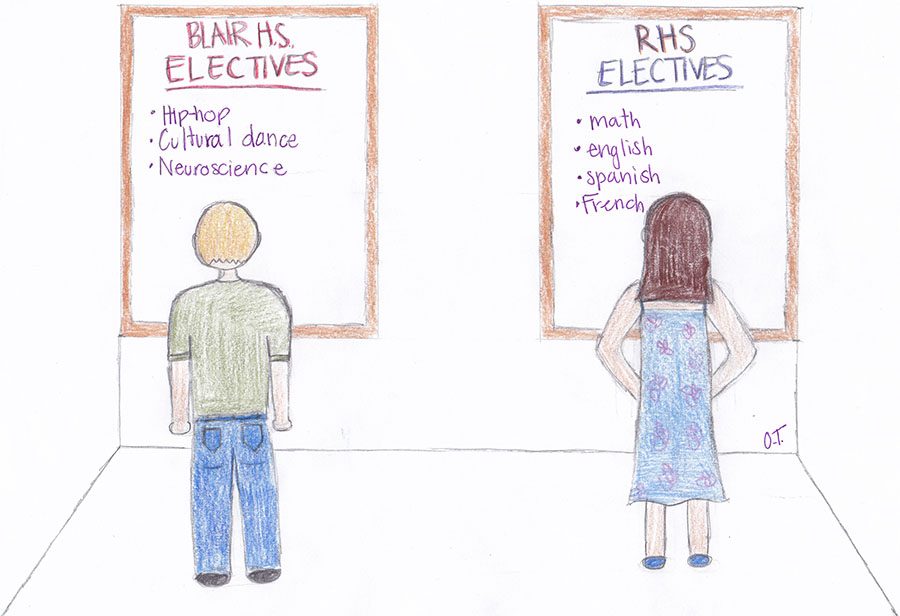RHS Needs More Elective Choices
After reviewing numerous electives offered at schools around the county, it is evident that RHS needs to offer more interesting choices for its students.
April 15, 2019
When January rolls around, students begin deciding which classes to take for the upcoming school year, but as they create their new schedules many will face the reality that there are not that many interesting elective classes to choose from.
Creating next year’s schedule should be a time for students to explore their interests by selecting classes that are intriguing to them. However, this critical time for students is mundane because after choosing required courses there are only a few enticing electives.
Following in the footsteps of Montgomery Blair High School’s (MBHS) new hip-hop and culture class that already has 120 students enrolled for next year, RHS should expand the course catalog with more electives to allow students to further their interests and break up the dullness of required classes.
The hip-hop class is the first class in this subject in the nation and MBHS social studies teacher Kenneth Smith is currently writing the curriculum with the help of his fellow teachers, African American museum curators and Timothy Jones, a lecturer and Hip-Hop Scholar in the Residence at Teachers College, Columbia University. Offering interesting classes like this allows students to explore a subject they are interested in while also still exercising important critical thinking skills.
Interesting electives can promote creativity. As the goal of education is to prepare kids for the future and careers, it is important for students to be able to brainstorm creative solutions for scenarios they may face in the future, from providing medical care to creating the most efficient mode of transportation. Creativity has been identified as the No. 1 “leadership competency” of the future, according to 1,500 CEOs in a 2010 IBM poll. As classes already offer some opportunities for creativity and critical-thinking in their assignments and curriculums, RHS needs more elective classes to provide further in-class experiences for the future.
Beginning in 2012, English teacher Sean Pang ran a new creative writing class in which students express themselves through fun writing such as poems and short stories rather than the typical analytical and constrictive essays that normal, required English classes teach, Pang said. There is currently about 60 students who take the course and about 70 students signed up for next year. RHS needs more elective classes such as this one as a breather from rigorous student schedules and to cater to student interest.
Some of the most popular RHS electives include Advanced Placement (AP) Psychology, child development and the International Baccalaureate (IB) sociology class combined with IB anthropology, counselor resource Alejandra Crawley said. Yet, these classes are still rooted in a traditional view of education whereas other MCPS high schools have more specialized electives that students can pick from.
Bethesda Chevy-Chase HS offers Chinese and Arabic courses; James Hubert Blake HS has an ancient and medieval history course and a mythology course;Winston Churchill HS has a website development class; Sherwood HS has a wildlife biology class; Walt Whitman has a class focusing on global issues in the 21st century and an astronomy class; and Watkins Mill HS runs a modern urban world history class.
Running new and stimulating elective courses will give students a break from the classes that need to be taken to fulfill graduation and International Baccalaureate (IB) requirements. This is essential for reducing stress levels and providing students with an entertaining, yet educational class period.
Education is undeniably one of the most important parts about adolescence that carries into the rest of life. Core classes such as mathematics, science, English and social studies are taught as the basis of the educational system, as they should be. In order to adequately prepare students for the future though, it is necessary that students take specialized elective courses that pertain to their own interests because it provides a well-rounded education and encourages positive attitudes toward school.
RHS should distribute a survey asking students what classes they’d like to take and give examples of what elective courses are offered at other high schools.
Following other schools’ leads, RHS needs to increase the number of unique electives — if it does not, students may be left without any respite from their schedules and their interests will be left uncatered.




